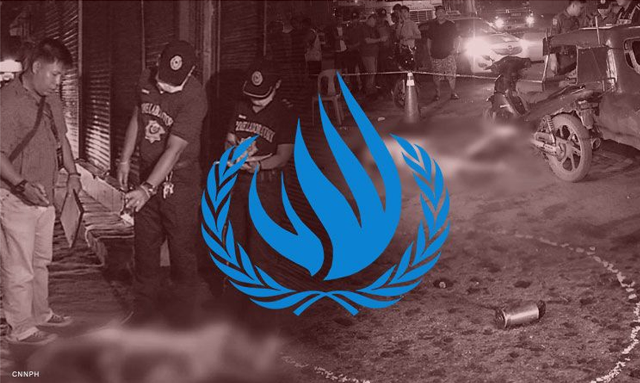UN Rights Body Resolution: Reactions Bury Some Exceptions

FROM ITS early months in 2016, the government’s campaign against illegal drugs has been confronted with protest against human rights violations in its implementation. But nothing has effectively restrained the “war on drugs” which, based on records of the Philippine National Police (PNP), continue to show the killings of suspects.
On Thursday, July 11, the United Nations Human Rights Council (UNHRC), during its 41st session in Geneva, Switzerland, adopted a resolution mandating a review of the human rights situation in the Philippines. Eighteen countries voted to adopt it; 14 rejected it, while 15 abstained. The resolution asked Michelle Bachelet, UN High Commissioner for Human Rights, “to prepare a comprehensive written report” which she will present in 2020, during the council’s 44th session.
Government reaction typified the response of the Duterte administration to criticism coming from international community. In 2016, then Foreign Affairs Secretary Alan Peter Cayetano told CNN’s Christiane Amanpour that critics should come to the country and not just read reports because “there are people out to discredit” the president. However, the president readily barked back at critics abroad, calling them “hypocrites” or worse.
Other officials expressed anger, threatened the country’s exit from the international body and gave free rein to outbursts. Faithfully recording reactions of government officials may fix the idea for many that this latest development was an affront to national sovereignty; that it was misguided by a lack of knowledge of the problems of the Philippines.
Only a few exceptions provided more information.
CMFR reviewed the coverage by the leading broadsheets (Philippine Daily Inquirer, The Philippine Star, and Manila Bulletin); the primetime newscasts (ABS-CBN 2’s TV Patrol, GMA-7’s 24 Oras, TV5’s Aksyon and CNN Philippines News Night), and selected news websites from July 11 to 15.
In general, media coverage focused on the political fireworks which rose from the ranks of government. Assailing the resolution, Palace Spokesperson Salvador Panelo called it “maliciously partisan.” Reports followed up on senatorial statements which echoed the official stance, saying our criminal justice system works and that we have a Commission on Human Rights anyway. Foreign Affairs Secretary Teodoro Locsin Jr. held nothing back, saying it was passed by a “tiny minority.”
Will the Iceland-initiated resolution make a difference?
An Aksyon explainer on July 12 discussed the resolution and mechanisms. It noted that in the event of country visits, there must be a formal invitation to rapporteurs or special investigators. In the absence of invitation, the UNHRC can tap human rights groups, non-government organizations and civil society groups for research work. The findings will then be submitted to the council with recommendations. While the UNHRC does not impose sanctions, Aksyon anchor Ed Lingao explained it could release resolutions condemning a particular government policy and demand action.
Other notable efforts were from online news sites.
Like the Aksyon explainer, CNNPhilippines.com on July 12 provided a breakdown of things to expect. In another report, the CNN Philippines talked to Agnes Callamard, UN special rapporteur on extra-judicial, summary or arbitrary executions, who said “rejection of the resolution itself may not have a cost, what will have a cost is the rejection of the findings of the inquiry.” She adds, “The cost can take many shapes – it can be sanctions, it can be something related to the assistance, developmental assistance, it can be symbolic, it can be economic, it can be political.”
An Interaksyon video on July 13 clarified that it will not be an actual international investigation in itself, but “will only establish the facts and give recommendations that can possibly result in effective resolutions.”
A Rappler report on July 15 noted that the Philippines is not the first country to be subjected to a human rights review, citing the case of Venezuela. It described how the review was carried out, what the findings were and the dismissive stance of Venezuela President Nicolas Maduro.
Philstar.com reported that member–states of the UN General Assembly elect UNHRC members, “taking into account the candidate states’ contribution to the promotion and protection of human rights.” As a member, the Philippines is set to serve until 2021. It detailed members’ commitments: to “uphold the highest standards in the promotion and protection of human rights, fully cooperate with the Council and be reviewed under the universal periodic review mechanism during their term of membership.”
The media would do well to highlight these obligations to help remind the seemingly forgetful government and engage the public in the appreciation of its international obligations.
Leave a Reply